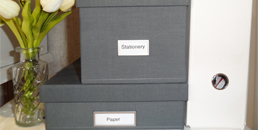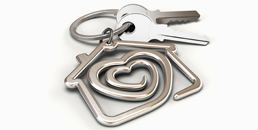by Natalie Morey | Sep 27, 2012 | Declutter tips, Home Office, Home Organisation, Tips
My life working as a Professional Organiser
I love working as a professional organiser because I have such a sense of achievement when I look around and see the space or area that I have decluttered and seeing that it’s organised and sorted. Perhaps it’s a room that was once cluttered and full of junk and you couldn’t see the floor and now it’s the guest’s bedroom. I get such pleasure working with clients and helping them with areas of their life that they are struggling with, whether that be there home, home office, garage or office. So that’s why I love working as a professional organiser.
However, working as a professional organising its not just about coming in and creating a perfectly organised bookshelves or cupboard. Some clients don’t want that. Some of our home organising assistance may simply involve clearing the clutter in the hallways and on the floors, so you can get through. Perhaps it involves making the space more functional or creating more room. Its also not about coming in and making clients throw out their precious items. Each client is different, as is each space and we customise our services to meet the exact needs of the client.
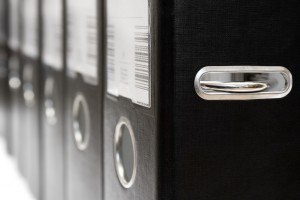
A Professional Organiser will help you order, sort, cull and organise your space, whatever the area.
Working as a Professional Organiser allows me to problem solve
Working as a professional organiser allows me to teach new ideas to people. It also helps me to develop my “problem-solving” skills, because every space and every home is different and you need to constantly create solutions for different spaces. Not only do I help organise people’s lives and living spaces, but I get to use lots of different storage product. I love anything organising related, especially organising product. And, as part of my job, working as a professional organiser I need to “road test” different storage products. (Well, that’s how I justify it anyway).
As a professional organiser, you are not emotionally connected to the items, so it makes it easier to be objective when helping clients to try and decide what to keep and what to get rid of.
Working as a Professional Organiser allows me to create more time and space
Time and space are precious commodities. You can’t make more of them, but you can manage them better. That is what I like doing most when I work with clients. We create more time, through better systems and processes and create more space by decluttering, culling and using the space in a different way.
Be consistent. You need to dedicate time each day to tackle the problem, declutter and get organised. Set a goal, it might only be 10 minutes a day, but set time aside every day and start decluttering, sorting and culling. Whilst I am a professional organiser based in Melbourne we also provide professional organising assistance in Sydney, Brisbane and Perth. So if you need any help, please don’t hesitate to contact me.
Until next time, happy organising.
Natalie Morey, Professional Organiser
by Natalie Morey | Sep 26, 2012 | Tips
Get Your Office Organised
People often think that they just don’t have enough time to organize their office, but if they really knew how much time that disorganization was costing them, they would reconsider. An organised desk saves you time, helps you work more productively and allows you to get more done. It also avoids double handling and time wasted looking for documents.
Get More Organised
So, if you want to be more organised and get more done, then having an organised office and desk is a must. Rearranging and moving piles occasionally doesn’t count. Nor does putting the mess into a bin, or a desk drawer.
Organizing your office doesn’t have to take days either. It can be done a little at a time, especially if you have thought about the systems and procedures needed to help you stay organised.
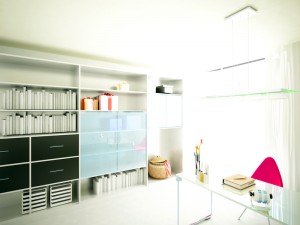
An organised home office, or office is one that has a good filing system and is clutter free.
Great Tips to Organize Your Office Space
- Declutter and purge your Office – Declutter, empty, shred or get rid of everything that you don’t need or want. Look around and see what you haven’t you used in a while? Tackle one area at a time. If it doesn’t work get it repaired or throw it out. If you haven’t used it in months and can’t think of when you’ll actually need it, then do you really need it?
- Does the item really belong on your desk? Collect every item that isn’t where it belongs and put it where it does. (You would be amazed at what we find in offices that just should not be there)
- Establish work “zones” – Decide what type of activity happens in each area of your office. You’ll probably have a main workspace (most likely your desk,) a reference area such as (filing cabinet, shelves, binders,) and a supply area (shelves or drawers.) Place the appropriate equipment and supplies in the correct areas.
- Clear your desk – Remove everything, clean it thoroughly and put back only the items that are essential for daily use.
- Label it. I love my label maker. Take the time to label files, shelves, baskets, drawers etc. Not only will it remind you where things go, but it will also help others who may need to find or put away anything in your workspace.
- Set up an in-tray. Papers need a “home” when they arrive on your desk. Remember to label your in-tray too.
- Set up a filing system. When filing or creating a filing system, remember that you are doing this to make your life easier. Make sure your system makes sense and that anyone coming into your office would be able to find what they need quickly. Don’t forget to label it as well. Lever arch folders also work well when you want to file documents.
- Organise your drawers. Group similar items in each drawer. For example, put all of your office supplies in one drawer, stationery and notepads in another. That way, it’s organised and you won’t waste time trying to find items.
- Archive old files. Review your paperwork and decide which papers you don’t need. There might be other items that you need to keep, but they don’t need to be kept on your desk or in your filing cabinet. Use archive boxes to store old files and get them out of your current filing cabinet or off your desk. If you have the space, they might even be kept in another area, so it does not clutter up your office.
- Clear your piles – Hopefully with your newly organized office, you will no longer need to sort through the old piles. Go through the pile (a little at a time if necessary) and put it in the an appropriate place or throw it out.
- Sort and action your mail – Don’t just stick mail in a pile to deal with later. Sort it as soon as you get it into piles such as– to act, to read, to file or to delegate.
- Reading folder – Designate a file for print articles and documents you want to read that aren’t urgent. Remember to set a time-frame by which they should be read. Otherwise this will be the start of another pile.
- 1 minute desk tidy up – At the end of the day do a quick tidy up, so that when you arrive the next day, its organised and ready for a productive day.
- File weekly – Don’t let your filing pile up. Put your papers in a “To File” folder and file everything once a week. Schedule time in your diary, perhaps 4.45 pm on Friday to do your filing.
- Changing habits. Keeping an organised desk is all about changing habits. Instead of thinking “I will sort that later”, do it now. Make sure you spend time at the end of your week filing documents and organising your desk. If you do that, you will have an organized desk in no time and will be getting more done.
I hope that these office organising tips help you to declutter and get your office organised so that you have less clutter and are more productive.
Until next time, happy organising.
Natalie Morey, Professional Organiser
by Natalie Morey | Sep 25, 2012 | Declutter tips, Home Office, Home Organisation, Office Organising, Tips |
How to organise and manage your home office computer
Just like work computers, home computers also need to be looked after and maintained. Ideally, you should have one person responsible for their maintenance. This becomes especially important when several family members use the same home office computer.
Backup data and photos
Backing up your data, photos and treasured memories on your home computer is just as important as backing up your work files. So often, when I’m in clients homes and I ask them when was the last time they backed up their computer, I am horrified. The answer is often “never”. There are some cost effective portable backup devices that you can purchase from Office Works and install on your computer.
Ideally, you should store your back up drive in a different location from where your computer is stored.
It doesn’t take long to do a back up. Put it on and go and watch TV or have a coffee (or continue working).
If you have kids or other family members accessing the same computer, it might be worth setting up separate log on’s for each person. That way your files are protected and cannot be accidentally deleted off when one of the kids is playing on the computer.
Internet security and virus protection
Internet security and virus protection is just as important on home computers as it is on business computers. Make sure it is current and working correctly. There are some cost effective virus protection programs on the market such as AVG, Norton. We use Trend PC Cillon which I find to be really reliable. If you need some assistance, then organise for your IT technician to purchase and install one for you. At The Lifestylers Group, we work with a range of computer technicians that do this sort of thing, so if you need some assistance, then we are only a call away.
Don’t learn the hard way. It is essential that your virus protection is working.
If you have wireless Internet connection at home (or in the office) it is vital that the network is locked down so no one else can access it. If it is unlocked people in the surrounding neighborhood can log onto your internet connection and use your internet. Unsecure networks makes it easy for people to hack into network and access data such as bank account log in details.
Suspect emails
It’s also really important to have a policy for how you handle suspect emails. This becomes particularly important when there are different family members using the same computer and receiving emails. If you see a suspect email “doing the rounds” let the other uses know not to open it, and delete it straight off the computer.
Always be wary of files that have the following wording EXC after the file name. These files are called executable files and often contain virus. Organising your home security is such an important part of owning a computer.
So do you need to check your internet security and virus protection after reading this article?
Until next time, happy organising.
Natalie Morey, Professional Organiser
by Natalie Morey | Sep 24, 2012 | Declutter tips, Home Organisation, Tips
Organizing Your Recipes Could Not Be Easier
I love these organising tips from an old Notebook magazine that I was flicking through. There are some great tips on how to organise your recipe collection. I thought that they might be useful for you too. Use lever arch folders and divide up with tabs for different sections i.e. Meat, seafood, dessert.
You might also want to make a section and file your weekly meal planners, that I mentioned in a previous blog too.
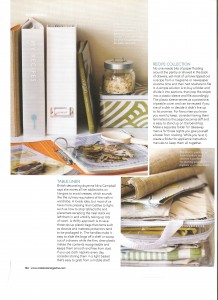
Organise, cull and sort your recipes
Until next time, happy organising.
Natalie Morey, Professional Organiser
by Natalie Morey | Sep 23, 2012 | Declutter tips, Home Organisation, Tips
Be organised and spring clean the environmentally friendly way
As I get older, I have become more concerned with what we are spraying around our house and environments and more importantly what we are breathing in.
So, I have started to use an oldie by a good option – bicarb soda and vinegar. You can clean just about anything with it. Sprinkle a little on your bench tops, then put some vinegar onto your dishcloth and wipe over the bench. The vinegar will start to bubble when it comes in contact with the bicarb soda. You know that it is doing the cleaning for you and that most importantly you are not breathing in any dangerous chemicals. It does a great job.
You can use bicarb soda on other things like:
- Sprinkle it in your shoes to keep them fresh.
- Put a little bowl in your fridge to remove any odors
You should also check out the book: Bicarbonate of Soda, Expert Advise by Diane Sutherland, Jon Sutherland, Liz Keevill and Keith Eyers. It is a great little book and has tips on cleaning practically anything in your house in an environmentally friendly way using Bicarb.
Until next time, Happy Organising.
Natalie Morey, Professional Organiser
by Natalie Morey | Sep 21, 2012 | Declutter tips, Office Organising, Tips
Stylish Home Office Filing Ideas
Now that your paper work is all organised and sorted, it is time to file it.
As professional organisers we love things to look organised and stylish too. I am always search for organising tips and ideas. I come across a great way to create stylish looking lever arch folders in the October 2012 edition of Better Homes and Gardens. I hope you like it too.
Take an A4 photocopy of your favourite photo, or perhaps some beautiful coloured stationery paper and cut stripes wide enough to cover the spine of your folders. Then, use double sided tape to fix the paper to your folder. It only takes minutes to have custom made, stylish folders. Don’t forget to label your folders too.
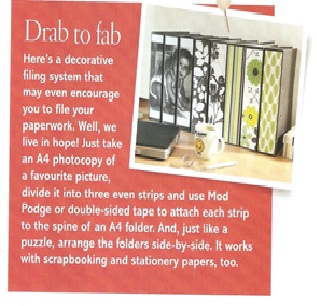
Organise, sort and declutter your home office paperwork
Hopefully this decorative filing system will even encourage you to do your filing as well! Talking of filing, if you need some help organizing, sorting and filing that pile of papers, then I have listed below some filing tips for you.
CREATING FILE CATEGORIES
Firstly, look at your current filing system (or that pile of paper on the floor or desk that you’ve been meaning to file for months) and start sorting your documents into broad categories. “Finances” might be one; “house stuff” could be another. At this point, we’re not focusing on the detail of your filing system, it is just the broad categories. At this stage it doesn’t matter if it’s a credit card bill or a bank statement right now. We can sort out the distinctions later on.
SUBCATEGORIZING
It is in this stage, that we start sorting into sub categories. Start with one of your “major category/ piles” and sort through it again. This time, you can put your papers into smaller subcategories. For example, your “finances” pile could be divided into:
- savings account – ANZ
- savings account – ING Direct
- check account
- Visa credit card account
- AMEX credit card account
It is important to be specific. Don’t just say that they are “bank statements”. Determine which account they belong to and break each out into a separate pile. It makes it easier to find if they are in specific groups.
Until next time, happy organising
Natalie Morey, Professional Organiser






